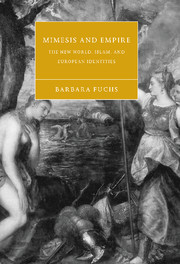Book contents
- Frontmatter
- Contents
- Acknowledgments
- Note on translations
- Introduction
- 1 Truth, fictions, and the New World
- 2 Literary loyalties, imperial betrayals
- 3 Lettered subjects
- 4 Virtual Spaniards
- 5 Faithless empires: pirates, renegadoes, and the English nation
- 6 Pirating Spain
- Conclusion: Contra originality
- Notes
- Bibliography
- Index
- Cambridge Studies in Renaissance Literature and Culture
5 - Faithless empires: pirates, renegadoes, and the English nation
Published online by Cambridge University Press: 22 September 2009
- Frontmatter
- Contents
- Acknowledgments
- Note on translations
- Introduction
- 1 Truth, fictions, and the New World
- 2 Literary loyalties, imperial betrayals
- 3 Lettered subjects
- 4 Virtual Spaniards
- 5 Faithless empires: pirates, renegadoes, and the English nation
- 6 Pirating Spain
- Conclusion: Contra originality
- Notes
- Bibliography
- Index
- Cambridge Studies in Renaissance Literature and Culture
Summary
I thought the diuell was turnde Merchant, theres so many Pirates at Sea.
Dekker, If This Be Not a Good Play, the Devil Is in ItThe English experience of piracy has usually been glorified as the proleptic wanderings of a future imperial power – pirates as the vanguard of the Empire. Under Elizabeth, England pursued a highly aggressive para-naval policy towards Spain; in the 1570s and 80s, piracy became England's belated answer to Spain's imperial expansion. Long before war became open in 1588, the queen was giving her not-so-tacit approval to privateering expeditions that ostensibly sought new channels for English trade but in fact consisted mainly of attacks on Spanish colonies in the New World. Elizabeth espoused piracy as a kind of imperial mimesis – if England had not yet managed to acquire its own empire, it could at least imitate Spain in exploiting the riches of the New World. Glorified with the name of “privateers,” Englishmen such as Francis Drake plundered Spanish colonies and enriched England's treasury. I would like to complicate this narrative of heroic exploits by analyzing how piracy proves a constant source of tension and embarrassment for the Jacobean state as it focuses on trade as a means to empire. As piracy grows uncontrollably, mimicking the English state in “ruling the seas,” it poses a challenge to the very powers who had authorized it.
- Type
- Chapter
- Information
- Mimesis and EmpireThe New World, Islam, and European Identities, pp. 118 - 138Publisher: Cambridge University PressPrint publication year: 2001



